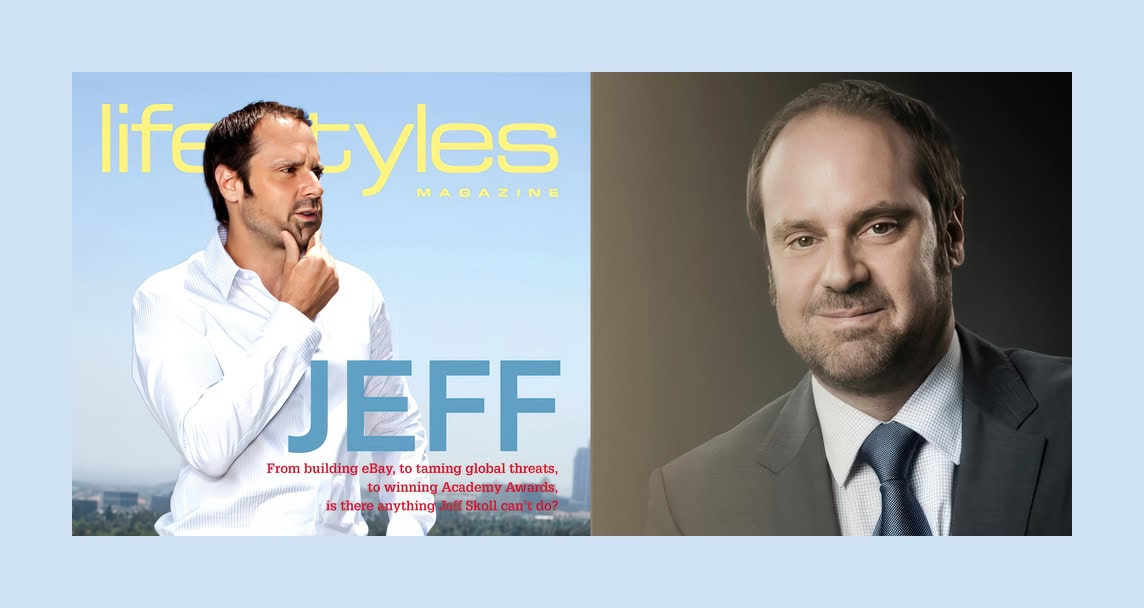$22.5 million latest gift from Lifestyles Magazine/Meaningful Influence Governing Committee member, mega-philanthropist Jeff Skoll to university will create network to unite artificial intelligence and health researchers

In one of the most significant gifts in its history, the University of British Columbia (UBC) has received a transformative $22.5 million donation from Canadian-born mega-philanthropist and Lifestyles Magazine/Meaningful Influence Governing Committee member Jeff Skoll through the Gordon B. Shrum Fund to establish the UBC AI and Health Network, an ambitious initiative designed to unite artificial intelligence and health researchers with system-wide partners across British Columbia and beyond.
The landmark gift promises to transform the development and deployment of AI in healthcare, with a focus on equity, collaboration, and practical application.
Skoll is widely recognized for his global philanthropic efforts through the Skoll Foundation, the Skoll Global Threats Fund, and Participant Media, which has produced socially conscious, multiple award-winning films, including An Inconvenient Truth and Spotlight.
UBC President Benoit-Antoine Bacon described the donation as “a generational investment in health innovation,” noting that the new network will position UBC and British Columbia as global leaders in the responsible and ethical use of AI in medicine.
“The UBC AI and Health Network is designed to be an engine of collaboration,” Bacon said.
“It will bridge disciplines, institutions, and industries—helping ensure AI tools in health care are not only cutting-edge but also trustworthy, inclusive, and impactful where it matters most: in the lives of patients.”
The UBC AI and Health Network will bring together experts in computer science, engineering, medicine, ethics, and public health to tackle critical challenges in healthcare, from diagnostics and predictive modeling to patient-centered care delivery.
System partners will include provincial health authorities, Indigenous communities, and tech innovators. A core emphasis will be on transparency, explainability, and culturally competent design—areas that have long been overlooked in AI applications.
The initiative is expected to provide seed funding for interdisciplinary projects, support the establishment of new faculty positions, and develop advanced computing infrastructure. It will also serve as a training hub for the next generation of AI health professionals, prioritizing equity and public benefit.
The donation was made through the Gordon B. Shrum Fund, a philanthropic vehicle named in honor of the iconic UBC professor and administrator who helped modernize British Columbia’s hydroelectric system and guided UBC through a transformative postwar era.
Though the fund has been active for decades, it had not previously made a gift of this scale or scope.
Today’s announcement marks the first public confirmation that Jeffrey Skoll has been directing substantial philanthropic capital into Canadian institutions through the Shrum Fund.
According to university sources, Skoll—an alumnus of the University of Toronto—sees this as part of a renewed commitment to invest in Canadian innovation, particularly at the intersection of social impact and science.
Skoll, who has kept a low public profile in recent years, is known for his quiet but deeply strategic giving.
While the Skoll Foundation has focused on global development and climate change, this gift signals a pivot toward AI and health, two areas that Skoll has identified as both opportunities and threats.
“AI is a tool. Whether it becomes a force for good or harm depends on who builds it and why,” said a spokesperson for Skoll’s philanthropic office.
“Jeff believes Canada has the intellectual depth and the public trust framework to show the world what a more humane and effective future of AI in health care can look like.”
The gift is widely expected to catalyze further public and private investment.
UBC officials confirmed that matching funds and collaborative partnerships are already underway with other universities and health authorities.
The university will also host an annual Global AI & Health Summit in Vancouver, starting in 2026, which will convene leading researchers, clinicians, ethicists, and policymakers.
For Canada, the UBC AI and Health Network could mark a turning point—not only in how it builds and governs artificial intelligence, but in how it reclaims leadership in global innovation with a distinct focus on values, transparency, and care.
As the world races to integrate AI into healthcare systems, Jeffrey Skoll’s landmark donation—made in the name of a historic Canadian builder—is a powerful reminder that transformative change often starts at home.
Jeff Skoll’s extraordinary philanthropy radiates an inspiring blend of vision and hands-on impact, defining him as one of the world’s most thoughtful givers.
Through the Skoll Foundation, into which he has invested well over $1 billion, Skoll has empowered social entrepreneurs and innovators to tackle humanity’s most pressing challenges, including global health, climate change, poverty, and peace-building.
Guided by his belief in “betting on good people doing good things,” Skoll doesn’t just write checks; he orchestrates transformative alliances and uses the power of storytelling, both in media and at global forums, to galvanize actionable change at scale.
His work exemplifies philanthropy not as charity but as catalytic investment in a fairer, sustainable future, echoing his deep sense of duty and hope for a world of enduring peace and prosperity.

